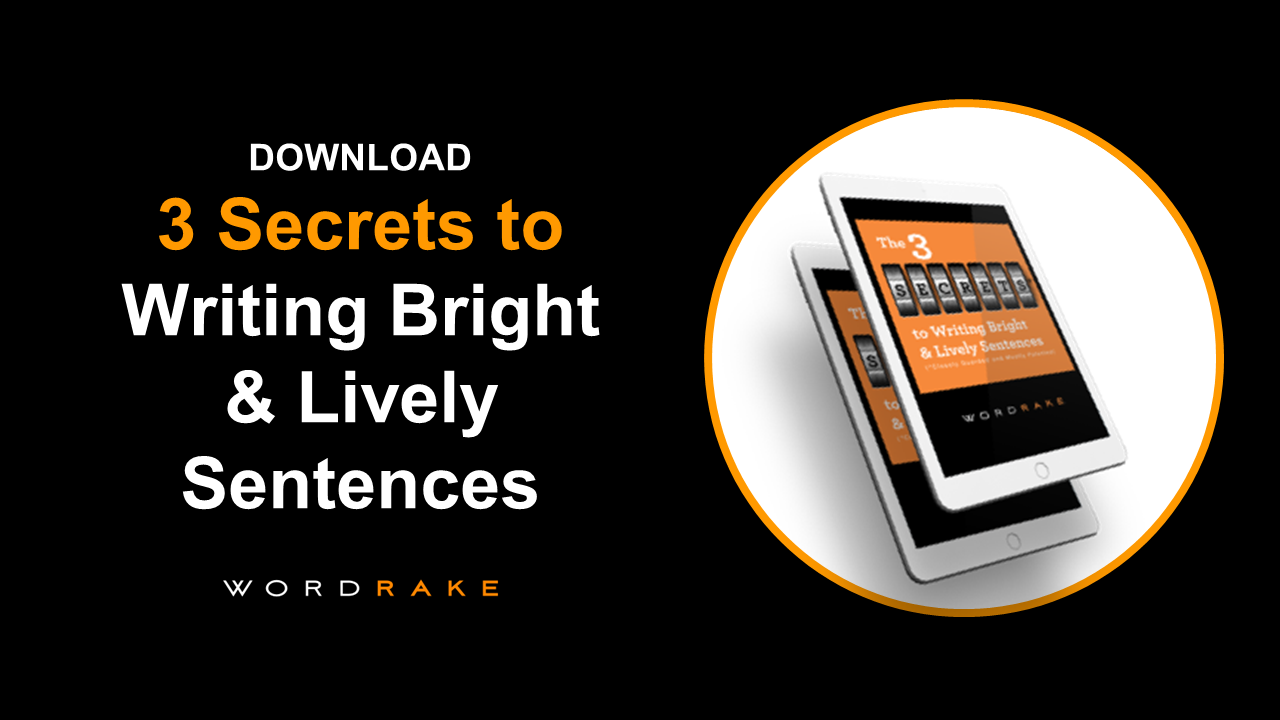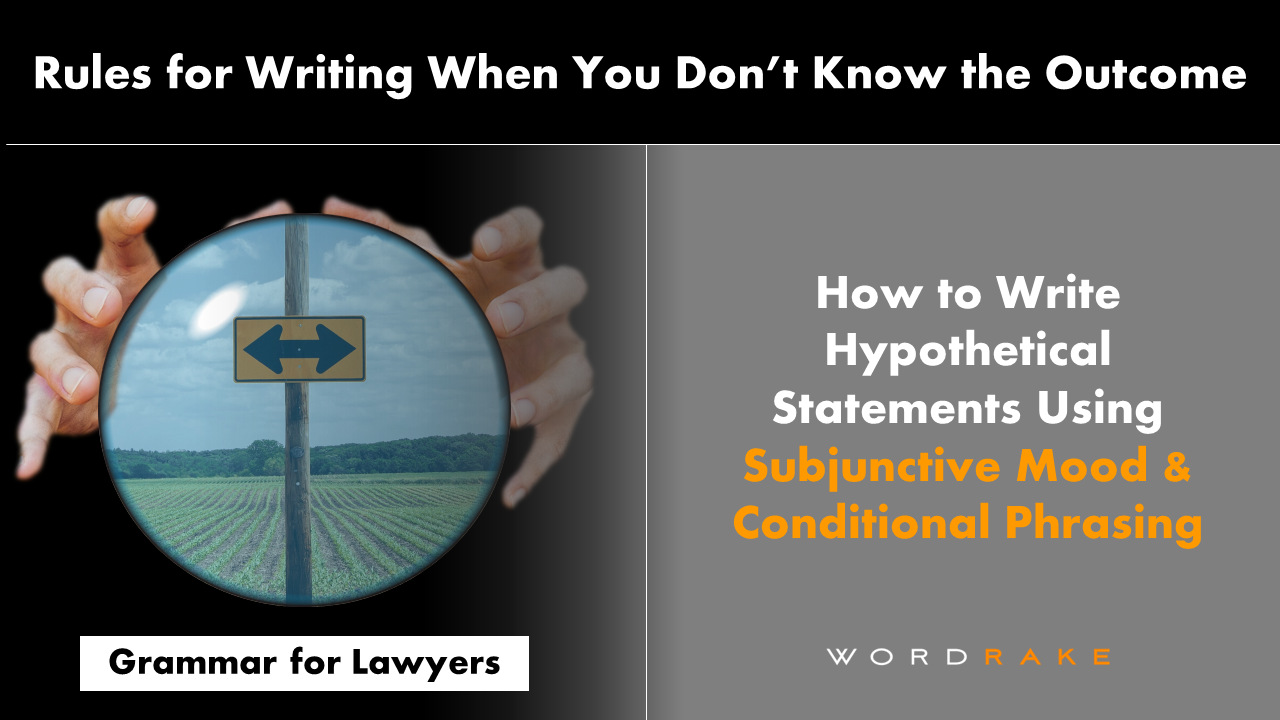It's hard to keep your mind on your task. The New York Times recently reported that brain fog is becoming an increasingly serious issue for the American workforce. The blahs that come from staring at your computer screen can be chased away by injecting some fun into your process. Enter gamification: adding elements of the gaming experience to a boring or unpleasant task to encourage you to complete it.
What’s Gamification?
Gamification, using game mechanics to make work more fun, is a relatively new term. It emerged online in 2008. Businesses, educators, healthcare professionals, and the U.S. government have all invested in gamification research and development. The idea itself isn’t new: teachers have been using elements of gamification to make learning fun for decades. The application to the workplace and household chores, however, literally changes the game.
Many companies have popped up to capitalize on this trend. From firms that specialize in large scale corporate incentive games, to software developers creating apps for individuals to gamify their most hated tasks, turning work into play has become an industry.
Bringing Joy to Your Editing Grind
While apps can help you gamify your daily slog, you can also play your own editing games, either alone or with a friend. Whether it’s racing yourself, or a dragon-slaying adventure, here are ten things anyone can try to keep their brain in the editing game:
1. Character Crunch
Character Crunch challenges you to condense descriptions while preserving your overall meaning. The game hones your ability to convey depth and vivid imagery in concise language.
How to play:
- Read each line of your piece and look for adjectives or adverbs.
- When you find an adjective or adverb, try removing it from the sentence. Does your sentence still make sense? Does it still have all the relevant information? If so, great! You get one point! If not, put it back and move on.
- Bonus rounds: see if there are any nouns, prepositions, conjunctions, or verbs you can eliminate.
- See how many points you can get by crunching down your sentences into something more manageable. If you get at least one point for every sentence, you win!
Example:
- Original: Her long, flowing blonde locks of hair blew gently in the wind and cascaded in endless ringlets like flaxen wheat pouring from an overfull silo.
- Find and remove unnecessary adjectives and adverbs: Her long, flowing blonde locks of hair blew gently in the wind and cascaded in endless ringlets like flaxen wheat pouring from an overfull a silo (5 points)
- Find and remove unnecessary nouns, verbs, prepositions, and conjunctions: Her long blonde locks of hair blew in the wind and cascaded in ringlets like wheat pouring from a silo blew in the wind. (5 points from original round + 12 points from bonus round = 17 points)
2. Filler Killer
You probably notice when you use filler words when you’re talking. The ums, uhs, wells, and likes come naturally in the flow of speech. But did you know that most people also use filler words when they write? The words are different. (You don’t add uh to a sentence in writing unless you’re like, uh, trying to make a point of it.) But the essence is the same. Filler words exist to add bulk and pause to what you have to say. When you’re aiming for clarity and brevity you need to kill the impulse to fill up space.
How to play:
- Search your document (either manually or using the search feature in Word) for filler words that don’t add meaning to your sentences. These are words like that, very, so, really, totally, and a lot. Other fillers include unnecessary introductions and transitions: and so, actually, however, in order to, as a matter of fact, in conclusion. (Feel free to add any others you overuse.)
- Check out the word in context. If you remove it from the sentence, does it change the meaning? If not, you can “kill the filler” by selecting the word and highlighting it in red (or any other color of your choice).
- When you’ve finished your document, see how “bloody” (or colorful) it’s become from all the words you’ve “killed.”
- Finally, clean up the evidence: delete your dead fillers and the highlighting around them.
Example:
- Original version: It was a very long day. As a matter of fact, in order to get to the end of the day I had to write so many emails that I couldn’t even focus anymore. I actually had to get out and really run around the block just to clear my head. Work was just totally exhausting. I’m so, so ready for the weekend.
- Identify and “kill” your filler words: It was a very long day. As a matter of fact, in order to get to the end of the day I had to write so many emails that I couldn’t even focus anymore. I actually had to get out and really run around the block just to clear my head. Work was just totally exhausting. I’m so, so ready for the weekend.
- Remove the filler words: It was a long day. To get to the end of the day I had to write so many emails I couldn’t focus anymore. I had to get out and run around the block to clear my head. Work was exhausting. I’m ready for the weekend.
3. Word Sale!
Stores are always offering big sales and discounts, especially around holidays. (It doesn’t even matter which holiday. Presidents’ Day mattress sales are everywhere). In this game, you’re taking the same attitude: cutting a big percentage off your total word count. Whether you’ve got a specific page limit, or you’re trying to keep your writing clear and concise, this game helps you set and reach that goal.
How to play:
- Set a goal for how much you want to cut from your writing. If you’re working with word or page limits, you already have a number to reach. If you need to set your own goal, select a percentage that feels doable. Are you a newbie to editing? Aim for 25-30% off. Are you a confident editor? Go for 40-50%. Trying to condense things down to a summary? Can you accomplish 90%? (Use a calculator if you need help figuring out exactly how many words your percentage is.)
- Once you’ve set your goal, go to work. Start with big edits: find any whole sentences or phrases that aren’t contributing to your piece. Delete them. Are there paragraphs that don’t need to be there? Drop them from your writing like you’re dropping prices on Cyber Monday.
- Check your word count. Have you reached your goal? If so, you win! If not, keep playing.
- Round 2: go through and find individual words that are unnecessary. Do you have unnecessary transitions, introductions, or prepositions? Delete them. Extra adjectives or adverbs that don’t add important information? Remove them.
- Check your word count. If you’ve reached your goal, you win! If not, go back and try again. Is there anything you can reword to be said more concisely? Continue chopping and rewording until you hit your word count goal.
Example: (Let’s edit some writers you might know! First up: Benjamin Franklin. Let’s cut down his wordy writing.)
- Set a Goal: Cut 50% (66 words of 132)
- Remove unnecessary sentences, phrases, or paragraphs: I am very sensible that it is impossible for me, or indeed any one Writer to please all Readers at once. Various Persons have different Sentiments; and that which is pleasant and delightful to one, gives another a Disgust. He that would (in this Way of Writing) please all, is under a Necessity to make his Themes almost as numerous as his Letters. He must one while be merry and diverting, then more solid and serious; one while sharp and satirical, then (to mollify that) be sober and religious; at one Time let the Subject be Politicks, then let the next Theme be Love: Thus will every one, one Time or other find something agreeable to his own Fancy, and in his Turn be delighted.
- Compare length to original: 61% (81 words out of 132)
- Remove unnecessary words: I am very sensible that it is impossible for me to please all Readers at once. He that would (in this Way of Writing) please all, is under a Necessity to make his Themes almost as numerous as his Letters. He must one while be merry and diverting, then more solid and serious; Thus will every one, one Time or other find something agreeable to his own Fancy, and in his Turn be delighted.
- Compare length to original: 49% (65 words out of 132 – You beat your goal!)
4. Sudden Reversal
Sometimes descriptions are unnecessary. You don’t need to describe a ball as round—round is the shape balls come in. If you reversed this description—say, a square ball—it wouldn’t make sense. We add these kinds of descriptions more often than we would like to believe. Sometimes the result is just extra words, but sometimes it draws unnecessary attention and questions. (I’m looking at you, Panera’s “clean ingredients” campaign.) This game is a fun way to see whether your descriptions are necessary or dragging your writing down.
How to play:
- Read your document looking for adjectives and adverbs.
- When you come to one, try replacing it with its opposite. Does your sentence sound ridiculous? If so, you may not need this description.
- Try deleting your adjective or adverb. Does your sentence still make sense? Great! Leave it out.
- See how many ridiculous sentences you can build, and how many words you can remove from your piece.
Example:
- Look for adjectives or adverbs: The judge released her legal decision Wednesday evening.
- Reverse the adjective or adverb to check if it’s redundant: The judge released her illegal decision Wednesday evening. (Changing this adjective doesn’t work.)
- If the adjective or adverb can’t be changed, it’s redundant—remove it: The judge released her legal decision Wednesday evening.
5. Repetition Remover
Overly repetitive writing is a hallmark of poor editing. If you’ve done a poor job editing, it will show in your final document. A poorly timed mistake can leave a poor impression on a client or potential client.
Did you notice I used poor in every sentence of that short paragraph? If not, try reading it out loud. Often, the repetition of the same word or phrase shows most clearly when a document is read aloud. This game aims to eliminate those repetitions.
How to play:
- Read your writing out loud and listen for words that repeat close together. When you notice a word repeating, go back and see how recently it’s been used.
- If your word has been used in the last four sentences, change it to something else or remove it.
- Bonus: Each time you remove or change a word or phrase, paste the original into a second document. See how many redundancies you can remove. For fun at the end, read the whole list aloud out of context.
Example (Ernest Hemingway):
- Read out loud to find words repeated close together: Robert Cohn was once middleweight boxing champion of Princeton. Do not think that I am very much impressed by that as a boxing title, but it meant a lot to Cohn. He cared nothing for boxing, in fact he disliked it, but he learned it painfully and thoroughly to counteract the feeling of inferiority and shyness he had felt…
- Change or delete the repeated words: Robert Cohn was once middleweight boxing champion of Princeton. Do not think that I am very much impressed by that as a boxing title, but it meant a lot to Cohn him. He cared nothing for boxing the sport, in fact he disliked it, but he learned it painfully and thoroughly to counteract the feeling of inferiority and shyness he had felt...
- Read out loud again to see how your writing improved.
6. Run-ons and Dragons
Are you a gamer? Do you enjoy role playing games? Make your editing process into a quest! By assigning characters and creatures to different types of errors, you can move through your writing like you’re moving through a castle—facing monsters and trying to stay alive as you do. Think of your document as a golden treasure being guarded by a dragon. Go on an adventure to slay the dragon and uncover the trove beneath.
How to play:
- Assign yourself a certain number of hit points (HP), depending on your level of writing confidence. Are you a confident writer? Give yourself 20 HP per page. Are you a novice writer? Do you often find a lot of errors in your writing? Give yourself 50 HP per page.
- Assign monsters to different errors and improvement opportunities. These monsters’ attacks will reduce your HP. You can customize your monsters depending on your goals and writing struggles. Big problems or mistakes you should have caught (like spelling errors, since you should be using spell check) cost more points, while small problems cost fewer points. Here’s a sample monster set:
|
Error/Opportunity |
Monster Type |
Effect on HP |
|
Spelling or Grammar |
Basilisk |
-3 |
|
Run-On Sentence |
Enormous Tentacle |
-3 |
|
Passive Voice or Nominalization |
Gelatinous Cube |
-2 |
|
Redundancy |
Mimic |
-2 |
|
Legalese |
Liche |
-2 |
|
Filler Words |
Vampire |
-1 |
|
Jargon |
Kobold |
-1 |
(These monster names come from the original game that inspired this editing game, but use whatever you like. Fight fanged strawberries! Attack tentacled Volkswagens! Slice sentient duct tape! Anything that strikes your fancy.)
- Start editing your document. Whenever you come across one of your “monsters,” fix it and subtract the corresponding number of HP from your total to “defeat” it.
- If you find places you can delete words or phrases that don’t fall under any of your monster categories, think of them as healing potions. You gain 1 HP for every word you delete (maximum 5 per sentence).
- Keep a tally of your battles, potions, and total HP as you go. When you get to the end of your document, if you have 5 HP or more left, you are strong enough to defeat the dragon! You win! If not, you have died on your quest. Better luck next time!
Example (F. Scott Fitzgerald):
- Confident writer. 20 HP
- Set up your monsters:
|
Error/Opportunity |
Run-Ons and Dragons Alias |
Effect on HP |
|
Spelling or Grammar |
Basilisk |
-3 |
|
Run-On Sentence |
Enormous Tentacle |
-3 |
|
Passive Voice or Nominalization |
Gelatinous Cube |
-2 |
|
Redundancy |
Mimic |
-2 |
|
Legalese |
Liche |
-2 |
|
Filler Words |
Vampire |
-1 |
|
Jargon |
Kobold |
-1 |
|
Other Unnecessary Words |
Healing Potion |
+1 |
- Find and fight your monsters (identify and categorize writing issues), then tally the HP they drained: He didn’t say any more, but we’ve always been unusually communicative in a reserved way, and I understood that he meant a great deal more than that. In consequence, I’m inclined to reserve all judgements, a habit that has opened up many curious natures to me and also made me the victim of not a few veteran bores. The abnormal mind is quick to detect and attach itself to this quality when it appears in a normal person, and so it came about that in college I was unjustly accused of being a politician, because I was privy to the secret griefs of wild, unknown men. Most of the confidences were unsought—frequently I have feigned sleep, preoccupation, or a hostile levity when I realized by some unmistakable sign that an intimate revelation was quivering on the horizon; for the intimate revelations of young men, or at least the terms in which they express them, are usually plagiaristic and marred by obvious suppressions. Reserving judgements is a matter of infinite hope. I am still a little afraid of missing something if I forget that, as my father snobbishly suggested, and I snobbishly repeat, a sense of the fundamental decencies is parcelled out unequally at birth. (-19 HP)
- Defeat the monsters (fix writing problems) and collect healing potions (remove other unneeded words): He didn’t say any more, but we’ve always been unusually communicative in a reserved way, and I understood that he meant a great deal more than that. I’m inclined to reserve all judgements, a habit that has opened up many curious natures to me and also made me the victim of not a few veteran bores. The abnormal mind is quick to detect and attach itself to this quality when it appears in a normal person, and it came about that in college I was unjustly accused of being a politician, because I was privy to the secret griefs of wild, unknown men. Most of the time I did not seek these confidences. Frequently, I have feigned sleep, preoccupation, or a hostile levity when I realized by some unmistakable sign that an intimate revelation was quivering on the horizon. When young men share their secrets, they tend to plagiarize their words and suppress parts of the story. Reserving judgements is a matter of infinite hope. I am still afraid of missing something if I forget that, as my father snobbishly suggested, and I haughtily repeat, a sense of the fundamental decencies is parceled out unequally at birth. (+6 HP)
- Clean up your writing and calculate remaining HP. (Total Remaining: 7 HP—You win!)
7. Battleship—Editing Edition—Game for Two Players
Have you ever played Battleship, the game where you try to guess where your friend has placed boats on a game board you can’t see to “sink” them before they “sink” yours? If you have a friend you exchange documents with regularly, you can play an editing version with them. Attack your opponent’s writing weaknesses before your document is sunk!
How to play:
- Before you give your document to your friend to proofread, hide one intentional error in it. Make a note for yourself of where your error is so you can remove it later if they don’t. If you will edit a piece for them, have them do the same.
- Exchange documents and proofread as usual.
- When your friend returns your document, check to see if they caught your intentional error. If they did, your ship is sunk! If you caught theirs, their ship is sunk!
- Whoever still has a “ship,” wins. If neither is found, or if both are found, it’s a tie.
Example (Charlotte Brontë):
- Give your friend a document to edit, and include 1 intentional, hidden error: There was no possibility of taking a walk that day. We had been wandering, indeed, in the leafless shrubbery an hour in the morning; but since dinner (Mrs. Reed, when there was no company, dined early) the cold winter wind had brought with it clowds so sombre, and a rain so penetrating, that further outdoor exercise was now out of the question.
- Your friend edits the document: There was no possibility of taking a walk that day. We had been wandering, indeed, in the leafless shrubbery an hour in the morning; but since dinner (Mrs. Reed, when there was no company, dined early) the cold winter wind had brought with it clowds clouds so sombre, and a rain so penetrating, that further outdoor exercise was now out of the question.
- Check if your friend found the hidden error. They found it—your ship has been sunk!
8. Editing Bingo—Editor’s Edition
You’re probably familiar with the game of Bingo. A 5x5 square game board with the letters BINGO written above it is filled with possible outcomes—numbers, science words, story elements, you name it!—and as those things are seen or heard, you mark them off on your board. In this game, your Bingo board is filled with types of editing errors. Fill out your game board ahead of time and see if you can mark off five in a row! You can play it whether you’re editing your own work or someone else’s.
How to play:
- Fill out a game board (download a blank Bingo card here) with the errors and opportunities likely to appear in the piece you’re editing. The center square on the board is a free space. If you’d like a pre-filled Editing Bingo card, download ours here.
- Figure out how you want to mark your card: you can print it out, mark it on your phone, or mark it on your computer.
- Start editing your work. Every time you run into something you need to change, mark it off on your Bingo card.
- Try to get five in a row. If you do, say “BINGO!” You win!
- Bonus round—try to get blackout Bingo, where you mark every spot on your card.
Example (Charles Dickens):
- Set up your game board with likely edits and errors:
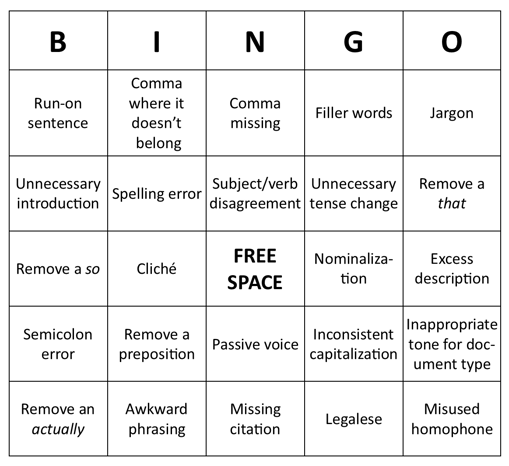
- Edit your writing: It was the best of times, ; it was the worst of times,. i It was the age of wisdom, ; it was the age of foolishness,. i It was the epoch of belief, ; it was the epoch of incredulity,. i It was the season of Light, ; it was the season of Darkness,. i It was the spring of hope, ; it was the winter of despair,. wWe had everything before us, ; we had nothing before us,. wWe were all going directly to Heaven, ; we were all going directly the other way.—in short, The period was so far like the present period, that some of its noisiest authorities insisted on its being received, for good or for evil, in the superlative degree of comparison superlative comparison.
There were was a king with a large jaw and a queen with a plain face, on the throne of England; there were was a king with a large jaw and a queen with a fair face, on the throne of France. In both countries it was clearer than crystal to the lords of the State preserves of loaves and fishes, that things in general were settled forever.
It was the year of Our Lord one thousand seven hundred and seventy-five1775. Spiritual revelations were conceded to England at that favoured period, as at this. Mrs. Southcott had recently attained reached her five-and-twentieth twenty-fifth blessed birthday, of whom a prophetic private in the Life Guards had heralded the sublime appearance by announcing that arrangements were made for the swallowing up of London and Westminster. Even the Cock-lane ghost had been laid only a round dozen of years, after rapping out its messages, as the spirits of this very year last past past year (supernaturally deficient in originality) rapped out theirs. Mere m Messages in the earthly order of events had lately come to the English Crown and People, from a congress of British subjects in America: which, strange to relate, have proved more important to the human race than any communications yet received through any of the chickens of the Cock-lane brood.
- Mark your Bingo card based on the edits you made. (Remember to mark the free space!)
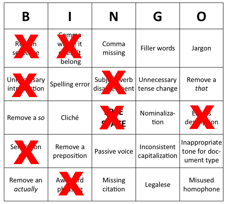
9. Editing Bingo—Feedback Edition
You don’t just have to play bingo with your own editing—you can play it when you’re receiving feedback too! If receiving feedback gives you anxiety, this game can be especially helpful. Use the time you’re waiting for revisions to create your game board. Then, as you review the recommendations, mark off the appropriate squares. It adds a lighthearted, low-stakes element to a stressful process.
How to play:
- Fill out a game board (download a blank Bingo card here) both with suggestions and with praise you expect you might receive. The center square on the board is a free space. If you’d like a pre-filled Feedback Bingo card, download ours here.
- Figure out how you want to mark your card: you can print it out, mark it on your phone, or mark it on your computer.
- Start reviewing the feedback you’ve received. Every time you run into a comment or suggestion, see if it appears on your Bingo card. If it does, mark off that square.
- Try to get five in a row. If you do, say “BINGO!” You win!
Example (Mary Shelley):
- Set up your Bingo card with likely edits and errors:
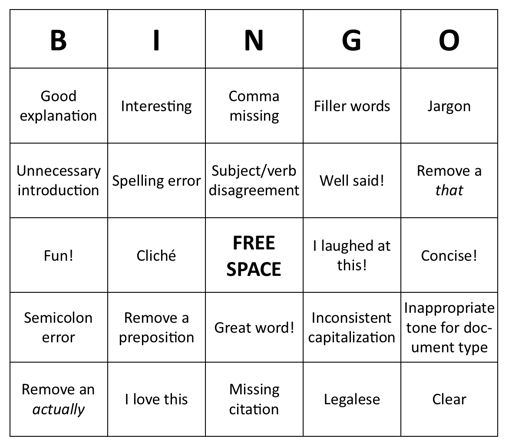
- Review the edits and comments from your reviewer: I am already far north of London, and as I walk in the streets of Petersburgh, I feel a cold northern breeze play upon my cheeks, which braces my nerves and fills me with delight. Do you understand this feeling? This breeze, which has travelled from the regions towards which I am advancing, gives me a foretaste of those icy climes. Inspirited by this wind of promise, my daydreams become more fervent and vivid. I try in vain to be persuaded that the pole is the seat of frost and desolation; it ever presents itself to my imagination as the region of beauty and delight. I love this description! There, Margaret, the sun is for ever visible, its broad disk just skirting the horizon and diffusing a perpetual splendour. There—for with your leave, my sister, I will put some trust in preceding navigators—there snow and frost are banished; and, sailing over a calm sea, we may be wafted to a land surpassing in wonders and in beauty every region hitherto discovered on the habitable globe. This seems questionable. Have you fact checked this? Its productions and features may be without example, as the phenomena of the heavenly bodies undoubtedly are in those undiscovered solitudes. What may not be expected in a country of eternal light? Interesting question! I may there discover the wondrous power which attracts the compass’s needle and may regulate a thousand celestial observations that require only this voyage to render their seeming eccentricities consistent for ever. I shall satiate my ardent curiosity with the sight of a part of the world never before visited, and may tread a land never before imprinted by the foot of man. These are my enticements, reasons and they are sufficient to conquer all fear of danger or death and to induce me to commence begin this laborious voyage. I feel the joy a child feels when he embarks in a little boat, with his holiday mates, on an expedition of discovery up his native river. What a fun analogy! But supposing all these conjectures to be false, you cannot contest the inestimable benefit which I shall confer on all mankind, to the last generation, by discovering a passage near the pole to those countries, to reach which at present so many months are requisite; or by ascertaining determining the secret of the magnet, which, if at all possible, can only be effected by an undertaking such as like mine.
- Mark your Bingo card based on feedback you received. (Remember to mark the free space!):
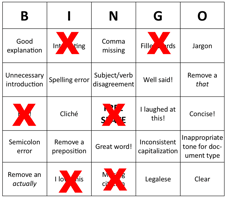
10. Beat the Rake—The WordRake Editing Game
We can thank our Chief Strategy and Growth Officer, Ivy B. Grey, for this game—Ivy created it to challenge herself to improve her writing using WordRake. With over 50,000 editing suggestions for clarity and brevity, WordRake’s substantive editing software has recommendations for every writer. Your goal is to guess the changes WordRake will make and see if you can write in a way that avoids them. The great news: WordRake is always updating, so even if you start consistently beating the Rake, there will always be new suggestions coming your way soon.
How to play:
- You will need WordRake for Microsoft Word installed on your computer to play this game. If you’re not already a WordRake user, you can download a 7-day free trial here.
- Write your document as usual.
- Once you’ve finished your first draft, click the WordRake tab in your browser. Depending on your writing goals, select the Brevity checkbox, Simplicity checkbox, or both, and then click the Rake button.
- If you got 0 suggestions, you win!
- If WordRake made recommendations, choose which ones work for you. Then next time, try to apply those same ideas to your writing before you Rake!
Example (Thomas Jefferson):
1-3. Install WordRake and open the WordRake ribbon in Microsoft Word. Choose to edit for Brevity and/or Simplicity, then click the Rake button:

- Review WordRake’s edit suggestions for clearer and more concise writing: The unanimous Declaration of the thirteen united States of America, When in the Course of human events in human events, it becomes necessary for one people to dissolve the political bands which have connected them with another, and to assume among the powers of the earth, the separate and equal station to which the Laws of Nature and of Nature's God entitle them, a decent respect to the opinions of mankind requires that they should declare the causes which impel them to the separation.
We hold these truths to be self-evident, that all men are created equal, that they are endowed by their Creator with certain unalienable Rights, that among these are Life, Liberty and the pursuit of and pursuing Happiness. --That to secure these rights, Governments are instituted among Men, deriving their just powers from the consent of the governed, --That whenever any Form of Government becomes destructive of these ends, it is the Right of the people to alter change or to abolish it, and to institute new Government, laying its foundation on such principles and organizing its powers in such form this form, as to them shall seem most likely to effect their Safety and Happiness. Prudence, indeed, will dictate that Governments long established should not be changed for light and transient causes; and in accordingly all experience hath shewn, that mankind are more disposed to suffer, while evils are sufferable, than to right themselves by abolishing the forms to which they are accustomed.
- Accept the edits you like and learn from them, so you can Beat the Rake in the future.
Conclusion
Whether you need help with a single writing task or lightening up regular editing doldrums, gamification is a great way to keep your mind on your work. Give these a try and have a good time getting stuff done!
Never know where to start when you’re editing your own work? WordRake can help. With over 50,000 editing suggestions to improve brevity and simplicity, WordRake makes the difference between passible communication and great writing. Take a 7-day free trial today!
About the Author
Kate Callahan is a Marketing Specialist for WordRake. Before her passion for learning and writing led her to join the team in 2023, she worked in non-traditional education, content creation, and translation. She started her career by teaching ESL to elementary school students in Japan. You can follow her on Twitter @KateC_Writing or connect on LinkedIn.



